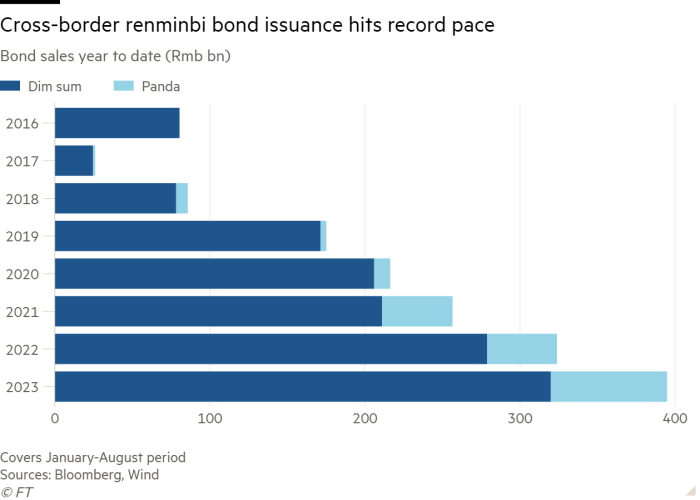Cross-border debt boom aids China’s efforts to widen renminbi use

Simply sign up to the Chinese business & finance myFT Digest -- delivered directly to your inbox.
Sales of cross-border debt denominated in renminbi have boomed this year, as relatively low yields in China’s bond market boost Beijing’s drive to increase the international footprint of its currency.
Sales of renminbi-denominated “panda” bonds by foreign issuers in China have risen to Rmb75bn ($10.4bn) so far in 2023 — already surpassing the full-year record set in 2021.
Issuance of renminbi-denominated “dim sum” bonds in Hong Kong is also at a new high over the same period, having topped Rmb320bn, according to data from Bloomberg and Chinese data provider Wind.
That takes the value of cross-border renminbi issuance to nearly Rmb400bn, up more than a fifth from last August and potentially on track to top record full-year sales of Rmb466bn from 2022.
Bankers and traders said this year’s rush had been facilitated by growing expectations that US interest rates would stay higher for longer while Chinese rates would remain relatively depressed as Beijing sought to bolster a shaky economic recovery.
It has benefited both the so-called panda market, which connects foreign issuers to a largely Chinese domestic investor base, and the more established dim sum market, typically used by Chinese borrowers to tap foreign capital.
“Onshore funding costs are cheaper than offshore, even on an after-swap basis for the dollar,” said Clifford Lee, global head of fixed income at DBS, referring to currency swaps that allow investors to exchange two currencies for a set period before swapping them back.
Cross-border sales of renminbi debt began to pick up substantially last year as rate rises by the US Federal Reserve pushed yields on dollar bonds above their renminbi counterparts, making the latter a source of relatively cheap financing.
The rise in panda bond sales has also been boosted by regulatory changes that took effect at the start of this year allowing issuers to take the funds raised out of China — albeit with official permission. Those efforts have attracted more foreign companies, said Lee, whose group has run renminbi bond deals in China’s onshore market this year for Mercedes-Benz and Crédit Agricole, among others.

Policymakers’ recent support for the renminbi has also helped slow depreciation against the dollar and encouraged further issuance by foreign corporates who had grown wary that the funds they raised could fall in value. But analysts warned that authorities would keep an eye out for any impact on the exchange rate.
“While this may be good news for renminbi internationalisation, the impact on the currency is mixed,” said Gary Ng, senior economist at Natixis in Hong Kong. “If firms swap the amount issued into other currencies, it could apply more downward pressure on the renminbi instead.”
A Shanghai-based banker at one European bank said some foreign issuers of panda bonds had been forced to offer rates that were higher than their local counterparts, “because they usually don’t have much of a credit line onshore, so it’s hard for domestic banks to recognise their creditworthiness”.
Comments